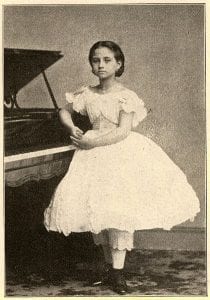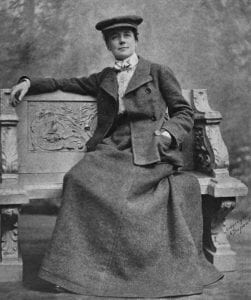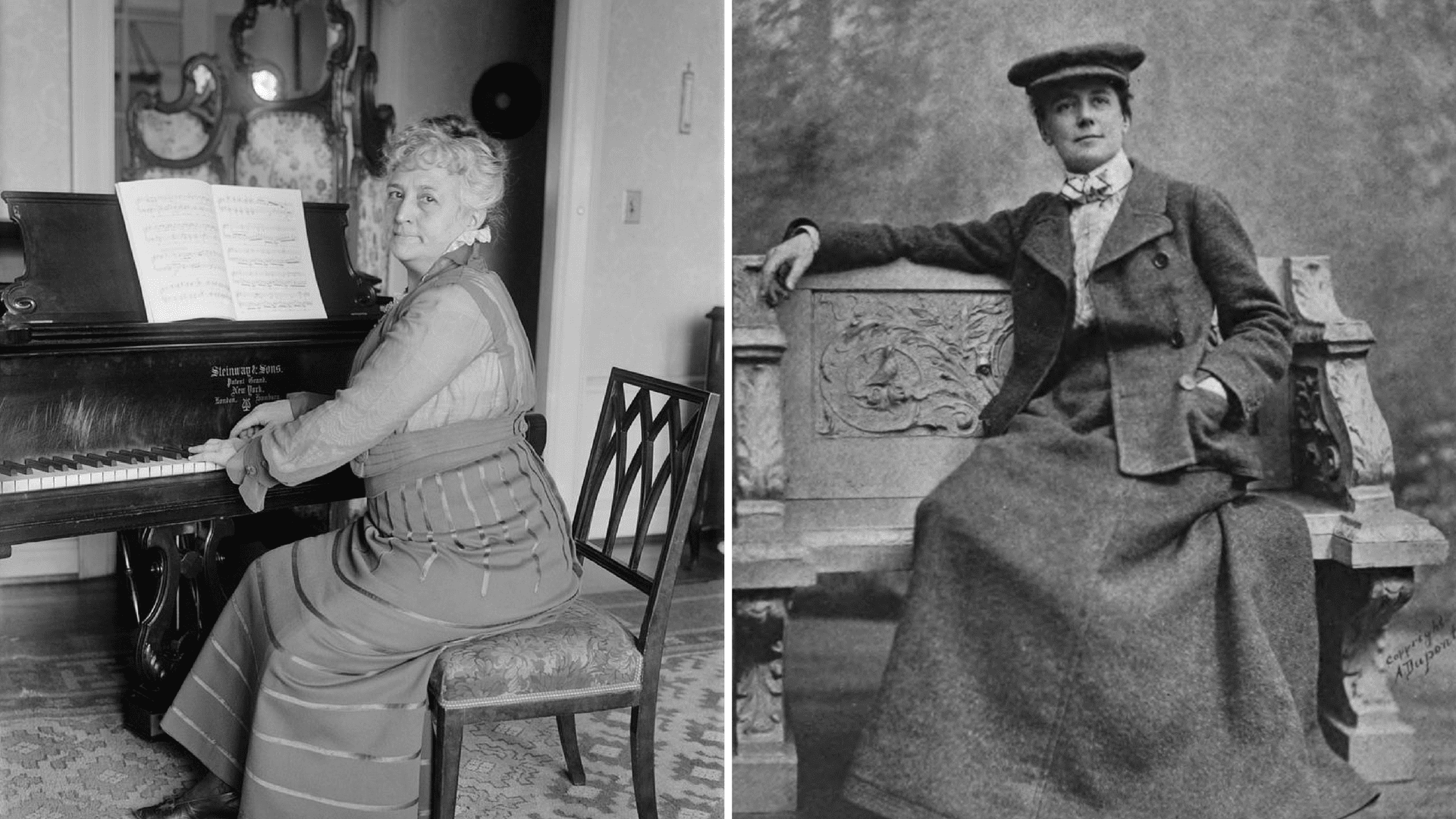This week, we kick off Women’s History Month by putting two fantastic musicians in the spotlight: Teresa Carreño, “Valkyrie of the Piano,” and Ethel Smyth, Dame Commander of the Order of the British Empire. These amazing women composed, conducted, and performed all around the globe and made dynamic contributions to the classical music world. Read below about their unique voices and careers.
The Valkyrie and the Dame: Two Musicians You Should Know About
Teresa Carreño (1853-1917)

Teresa Carreño at the age of 8, photograph taken in 1861.
There have been many great nicknames for all-star performers over the years – “The King” (Elvis), “The Duke” (Ellington), “The Man in Black” (Johnny Cash) – but have you heard of “the Valkyrie of the Piano?” María Teresa Carreño García de Sena was a Venezuelan pianist and composer and was one of the most popular touring artists of her time. In her 54-year concert career she toured the world and composed roughly 75 works for solo piano, piano and voice, choir and orchestra, and chamber ensembles.
Carreño was born in Venezuela and immigrated with her family to New York City when she was eight years old. While there, she met and began to study piano with Louis Moreau Gottschalk who eagerly encouraged her to perform and helped her set up her premiere performance in NYC at just 8 years old. She would go on to perform numerous concerts over the years across the globe, performing both her own works and works by other composers. As a teenager she lived in Paris and regularly toured Europe as a performer. She returned to Venezuela in her early thirties for a brief time, starting a short-lived opera company, but returned to the US at age 34 where she finished out her illustrious career.

Teresa Carreño, 1916.
What made Carreño so special as a performer was her energy. She was said to have an unbridled passion for performing and would bring dynamic interpretations to life on stage, leaving audiences breathless. Being an international touring artist in the 19th and 20th centuries, before airplanes and the internet, required an immense degree of fortitude since the travel time was long and uncomfortable. The fact that she remained indemand as a performer for over a half century is a testament to her incredible talent as a live performer.

Teresa Carreño, 1917
As a composer, she focused on works for piano and published her first piece in 1863 when she was just nine years old. An innovative element of her work is how she incorporated the merengue, a type of Dominican music, into her compositions. Carreño would insert merengues as interludes – in between other larger sections of a piece. An example of this unique style can be heard in her piece Un bal en rȇve which has a dance-like feeling. Imitations of different musical styles are common among music of this era, but Carreño had a particular talent for this merging of styles. Recordings and musical scores of her works are still available today.
Carreño has had a lasting impact on her home country of Venezuela. In Caracas, where she was born, there is a performance space called the Teresa Carreño Cultural Complex, which is home to the Venezuelan Symphony Orchestra. The building also houses several of Carreño’s historical correspondences, musical scores, and photographs. The legacy of the “Valkyrie of the Piano” lives on through her published works as pianists continue to perform and record her music to this day.
Dame Ethel Mary Smyth, DBE (1858-1944)

Ethel Smyth, c. 1903.
Someone who earns the title “Dame Commander of the Order of the British Empire” for their work as a writer and composer has to be an exceptional intellectual. Ethel Smyth was just that, and had a robust career despite extreme prejudice against women composers. Smyth wrote a broad spectrum of music, ranging from orchestral, to choral, to piano, to chamber, and is also known for her direct involvement in the women’s suffrage movement.
Smyth’s father, John Hall Smyth, was a major general in the Royal Artillery of the British Army and was staunchly opposed to her having a career in music. Smyth starting studying privately at the age of 17 and, even after demonstrating great talent, had a heated battle with her father about studying music at a conservatory. Defiant as always, she ended up going to the Leipzig Conservatory where she met famous composers of the time like Dvořák, Grieg and Tchaikovsky. She left the conservatory after just one year to study privately and network with her contemporaries. Smyth made a name for herself in Germany by writing lieder (art songs), and stayed there for some time until returning to England when she was in her thirties.
In England, Smyth wrote a great deal of music, including her most famous choral work, Mass in D. The hauntingly beautiful mass had a profound impact on audiences everywhere. Irish playwright Bernard Shaw said of the work, “it was your music that cured me forever of the old delusion that women could not do man’s work in art and all other things.” Additionally, her opera The Wreckers is, according to The Journal of Aesthetic Education, viewed by some as the “most important English opera composed during the period between Purcell and Britten.” Recordings of these works and others exist today, as well as scores in public domain.
Smyth was imprisoned several times over the course of her life for her involvement with the women’s suffrage movement. She ended up in Holloway Prison once for throwing a rock through the window of an anti-suffragist politician. While in prison, several women gathered in the prison yard to sing a piece Smyth had composed, “The March of the Women.” Smyth is reported to have grabbed a toothbrush, extended her arms through the bars of her prison window, and conducted the gatherers. Smyth composed the piece as the anthem for the Women’s Social and Political Union of the United Kingdom and it became the rallying cry for the women’s suffrage movement in England.
For all of the work mentioned above, and more, Ethel Smyth was awarded the title of “Dame Commander of the Order of the British Empire,” which is the female equivalent of a knighthood (Knight Commander of the Order of the British Empire). Her music is powerful, and her political efforts helped to achieve equal voting rights for women in the United Kingdom.







Leave a Reply